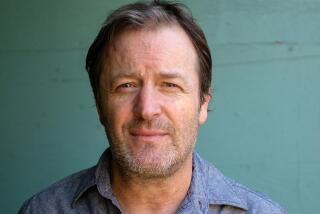FOR WILD BILL, A ROYAL OLD GUARD BLUES PARTY
- Share via
The invitation, in a severe royal blue with a gold cornet embossed upon it, cordially solicited attendance at a party in honour (this was strictly a “u” event) of William Edward Davison. Lest the name ring no immediate gongs, the next line said Wild Bill.
The gathering in a crowded ballroom at the Airport Marriott hotel was held on the eve of Davison’s 80th birthday (Jan. 5) and was in celebration as well, the invite said, of his 66th year in music.
Having discovered in early youth that you could make satisfactorily jazzy sounds by blowing into pieces of garden hose, Davison progressed to the banjo and then the cornet and was playing for dances while still well within his teens.
When jazz, bound north from New Orleans en route to the wide world, paused in Chicago in the ‘20s and ‘30s, it acquired some new tunes, places for the saxophone (not initially a Dixieland instrument) and a headlong, driving style that was distinctly its own. Wild Bill Davison was one of its founding fathers and is now, with saxman Bud Freeman and pianist Art Hodes, one of its very, very few surviving practitioners.
What the gathering Saturday night was was a mini-jazz festival in the form of a birthday party. Bill’s local musician pals turned out in force, and other pals blew in from far places.
Dolly Baker, an American singer in the tradition of Sophie Tucker, has lived in Tokyo for two decades, teaching the Japanese the American ballad style. She flew in for the event and induced Davison to exchange some scat-song choruses. She first got Bill to scat, she explained, when they performed together during his very successful tour of Japan last October.
Carol Leigh, who recorded with Davison in Sweden a few years ago, came in from Connecticut and exchanged some more scat-singing choruses with him. He looked pleased, if startled, that such sounds should come from him.
Tom Saunders, a Detroit cornetist for whom Wild Bill was an early idol, came to town and played backup for the night’s star. Clarinetist Chuck Hedges, a virtuoso who has also recorded with Davison, flew in from Milwaukee, and pianist Bob Hirsch and clarinetist Bob Newman came down from Sacramento to be part of the Davison band for the night.
The local men included the veteran tenor sax man Eddie Miller, another of the founding stylists, who will be 75 in June; pianist-mellophonist Dick Cary, trumpeter Dick Cathcart, pianist Johnny Varro and enough other stars to make two parades.
Wild Bill (who came by his name the hard way--earning it) was said in earlier times to have destroyed two bottles of Scotch a day without evident damage to his walk or melodic gifts. He is also famous for chewing gum as he plays, an intricate but dangerous accomplishment which is not known to have clogged his mouthpiece with Spearmint, yet.
He abandoned both alcohol and tobacco more than a year ago, he announced with a mixture of pride and amazement Saturday night, and on the bandstand he looked in pink and well-nigh cherubic good health, chomping gum as usual and leading his troops through “Indiana” and other familiar anthems with fire and power that would have been impressive in a brass man half his age.
Somebody once characterized Davison’s style, I think, as “Damn the torpedoes, full speed ahead.” It still fits. He could set a statue to tapping its toes. But it was interesting, sitting close, to hear his quiet noodling arpeggios behind the singers; he works handsomely in less assertive moods as well.
It was by its nature a warm and affectionate evening. But it was a tonic night musically, because it reminded you yet again that at the heart of jazz is improvisation, solo and collective--the spur-of-the-moment creation that sets jazz apart, now and ever, from the other arts.
And on Wild Bill night, musicians who may well never have stood together in quite the same combinations before were putting together arrangements as they played that by the last ride-out chorus sounded as if they’d been doing it just that way for years.
There was a moment in mid-evening when the clarinet men, Chuck Hedges and Bob Newman, were exchanging four-bar breaks that were swinging and lovely, a lyrical dialogue for reeds. I don’t remember the tune; it doesn’t matter; it was the variations that thrilled.
It struck me one more time that, as fine as the music is to listen to, the pleasure is equal, and maybe greater, behind the instruments. I wouldn’t want to guess who had the better time on Wild Bill’s wild night, those who played or those who heard.
More to Read
The biggest entertainment stories
Get our big stories about Hollywood, film, television, music, arts, culture and more right in your inbox as soon as they publish.
You may occasionally receive promotional content from the Los Angeles Times.










